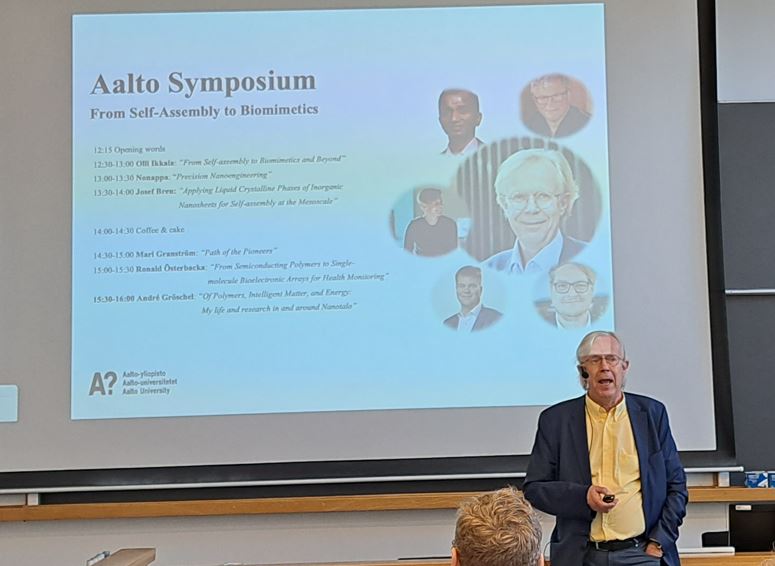To plan or not to plan
Last Friday we celebrated the 70th birthday of Prof. Olli Ikkala in a symposium “From self-assembly to biomimetics”, and in an alumni event after that. This got me thinking of all the valuable lessons I learned from him in his group, Optics and Molecular Materials, while I was doing my PhD at Aalto University. Prof. Ikkala was the best supervisor I could ever hope for.
The event got me also thinking about something else: How people plan their career paths? Prof. Ikkala got a question from the audience, which was “How do you get all your ideas for research?”. And the answer was: “I have never planned what to do”. This answer made me very happy since I feel the same and I see from his work that this approach may lead to amazing science.
Good teachers and mentors are so important for students, and I feel lucky of being able to do my PhD under supervision of such a brilliant professor. Thus, I dedicate this blog to Prof. Ikkala, and give here a few examples about the topics I learned from him, and how I now use this knowledge in my research in the field of batteries.
Conjugated polymers and their self-assembly
One of the main topics I studied during my PhD was conjugated polymers. They are polymers, which have alternating single and double bonds, and can thus have conducting or semiconducting properties. Conjugated polymers are tricky to process due to their rigid structure, but I learned from Prof. Ikkala how to dissolve or disperse them in solvents, how to characterize them and how to tune their properties. It was fascinating to also learn that polymers, block-copolymers, and different material blends can form self-assembled structures – and that it is possible to control this self-assembly even at nano- or micrometre scale.
This knowledge helped me for example to optimise the use of polymer blends as semiconducting materials in transistors after my PhD. In addition, I understood how mixtures of fullerenes and conjugated polymers behave and used those in organic solar cells.
Conducting polymers in batteries
Now, after jumping into the battery field a few years ago, I have realized that conducting polymers are very important for batteries as well. Of course, ionically conducting polymers can be used as the solid electrolyte. And conjugated polymers can be used as conducting additives in the electrodes. These are topics we are working with in the SOLiD project.
But when I was studying the structure and properties of liquid crystals in the group of Prof. Ikkala, I never imagined that I would end up using those in batteries! I learned then about the different liquid crystal structures, from nematic to gyroid. And now we use these materials as self-healing electrolytes in the HIDDEN project to increase the battery lifetime. You never know which information will become useful in future.
Beyond technical knowhow
Besides the technical knowhow, I think the most important learnings from Prof. Ikkala are related to the way of thinking. I saw how curiosity and open mind can lead to great ideas. I realized that magic may happen when two different research fields are combined. Sometimes the most surprising inventions are created by combining ideas that are not usually combined, or even by mistake if you just keep exploring the unknown. I followed him taking inspiration from nature. And I understood the importance of building collaborations.
And even though I do not feel like an electrochemistry expert, which might be considered as a severe drawback in the battery research, I value all the different skills that a diverse background can bring. But I would not survive without my colleagues who know much more about batteries than me. This is the reason why I have built a brilliant team of electrochemists to work with me 😊
To come back to the initial question: To plan or not to plan. I think both ways are equally good and equally needed. It is up to everyone to decide, which approach feels the best. If you are lucky and have a clear plan, which you follow, that is great. But if you might sometimes drift a bit from topic to topic and decide where to go along the way, it can lead to as good outcome.
Most importantly, it is never too late to learn new skills. If you feel like trying, just go for it and dare to suck at first. In the academic world, it might slow down writing of publications for a while (yes, I personally know that this can happen 😉). But it is worth it if you are following your hearth.
PS. I copied the “Dare to suck” phrase from Instagram by Fatima Witick. She shares there great tips about taking care of your well-being with simple exercises (mainly in Finnish but sometimes in English too).
